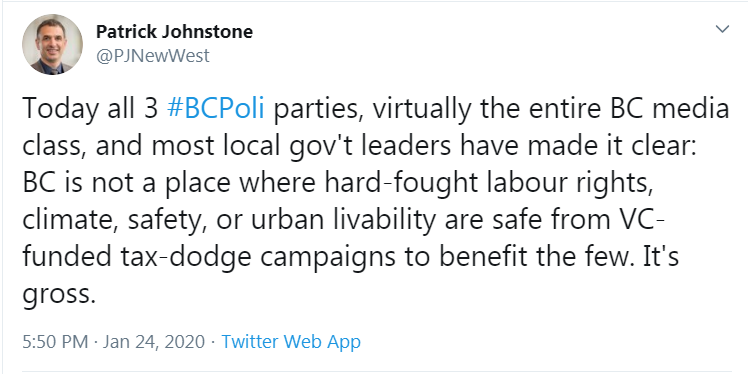I have tried to avoid the social media storm that is the long-awaited arrival of large, legal ride-hailing operations in Greater Vancouver. Though I think this tweet sums up my feelings at the end of the day yesterday:
And eventually, during a transit ride home that I drafted my subtweety response:

So, it is clear that I am not excited about the arrival of Uber and Lyft, despite the almost constant media saturation and lobbying pressure from Uber Spokesfolks (in contrast, I have not received a single letter, e-mail, or phone call, or invite for a meeting from the Taxi industry on this topic). My tweet lead to a few questions from people who have never connected with me on social media before. It was also referenced in a local Reddit comment thread, so I drafted up a Reddit response. Apparently multi-platforming is the hot thing in media today, so I figured I would re-draft the Reddit response for a blog here, without even taking time to edit out all the damn brackets, because who has time? Here we go!
In response to concerns that Uber or Lyft are not available today in New West (or Maple Ridge or Delta), I need to clarify that ride-hailing companies will decide what areas they want to serve. It should hardly be surprising to anyone that they are concentrating on areas already served well with transit – those are the areas where there is a density of users and destinations to support the business case of ride hailing. Because it is the same business case that supports Public Transit in the neo-liberal model of service delivery.
The regulations created by the provincial government are really clear: local governments cannot prevent operation of ride-hailing within their borders. They can regulate the service by requiring things like business licences and set conditions for pick-up/drop-off in their road and parking bylaws, but they can’t just say “no”. In this sense, the Mayor of Surrey (in my humble opinion)is blowing smoke. He could, I guess, create a regulatory and licencing regime that is so difficult to navigate that no-one bothers, but I seriously doubt he has the enforcement personnel to make that effective. I guess time will tell how that works out.
New West is working with regional partners to set up a regional business licence system for ride hailing, we talked about it back in November, and the best update I have is that staff in the many municipalities are still hammering out the details. Unfortunately, the sausage-making of making harmonized regulations work between all these jurisdictions is difficult, and they really couldn’t get started until the provincial regulatory regime was made clear. Such is government.
My understanding (and I stand to be corrected here) is that ride hailing companies licensed by the Passenger Transportation Board to operate in the Lower Mainland can operate in New Westminster (and Surrey and Coquitlam, etc.) right now. There will be a period of shake-down as they get their drivers organized, their service areas worked out, and local governments get the licencing requirements (and enforcement processes) organized. It’s a new world, and there is nothing unique about this as these kind of choppy launches occurred in every single jurisdiction where ride-hailing launched.
My personal opinions about Uber and Lyft have very little impact on this. As I mentioned, back in November, New West Council set out the framework for staff about how we feel ride-hailing should operate in New West. Some parts of it I agree with, some I don’t. My concerns about labour rights, environmental impacts, road safety, traffic impacts, transit system impacts, and neighbourhood livability are based on a *lot* of research about impacts of ride hailing in other jurisdictions. It has also proven in other jurisdictions that most of the promises of ride-hailing (cheaper! more convenient! fun!) are false, and the entire business model is propped up by massive financial losses. The system itself is not sustainable, which makes me wonder why we are rushing into embracing it (see “media saturation and lobbying effort” above). I trust urban transportation experts like Jerrett Walker on this more than I trust the well-oiled Uber/Lyft marketing machine. The Taxi system is not perfect, but I have gone on at length (note this piece from several years ago) about how it is actually the arcane regulation of the industry that makes it not work the way we might like. But that’s another rant, and times have changed since I wrote that piece. Not for the better.
But that said, my (Council) job is partly to advocate for things that make the community stronger and more sustainable, but it is equally to assure the City is run as effectively and responsibly as possible. Ride-hailing is here, (some) people want it, the local government job is to work to reduce the inevitable externalities and make it work as best as possible in our community. Of course, one of those externalities is that this “cheap” transportation option is going to cause your property taxes to go up a little bit. Uber and Lyft don’t pay taxes to the City, and regulation and enforcement are not free.
You may not like Uber or Lyft, but due to powerful lobbying and a brilliant international viral marketing program, you will be paying for it.